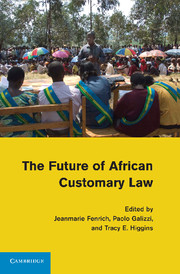Book contents
- Frontmatter
- Contents
- Notes on Contributors
- Acknowledgments
- Introduction
- Part One The Nature and Future of Customary Law
- 1 A Survey of Customary Laws in Africa in Search of Lessons for the Future
- 2 The Future of Living Customary Law in African Legal Systems in the Twenty-First Century and Beyond, with Special Reference to South Africa
- 3 The Future of Customary Law in Africa
- Part Two Ascertainment, Application, and Codification of Customary Law
- Part Three The Role and Power of Traditional Authorities
- Part Four Customary Land, Property Rights, and Succession
- Part Five Customary Criminal Law
- Part Six Customary Law, Human Rights, and Gender Equality
- Index
- References
2 - The Future of Living Customary Law in African Legal Systems in the Twenty-First Century and Beyond, with Special Reference to South Africa
Published online by Cambridge University Press: 05 February 2012
- Frontmatter
- Contents
- Notes on Contributors
- Acknowledgments
- Introduction
- Part One The Nature and Future of Customary Law
- 1 A Survey of Customary Laws in Africa in Search of Lessons for the Future
- 2 The Future of Living Customary Law in African Legal Systems in the Twenty-First Century and Beyond, with Special Reference to South Africa
- 3 The Future of Customary Law in Africa
- Part Two Ascertainment, Application, and Codification of Customary Law
- Part Three The Role and Power of Traditional Authorities
- Part Four Customary Land, Property Rights, and Succession
- Part Five Customary Criminal Law
- Part Six Customary Law, Human Rights, and Gender Equality
- Index
- References
Summary
Introduction
Alleged imminent demise of customary law, or some aspects of it, has been and still remains a subject of intense debate among scholars, individuals, and in conferences. The following statements often characterize this debate: “the end of the road for customary law,” “the final nail in the customary law coffin,” “withering province of customary law,” “obituary of customary succession law,” “death shadows,” “killing it softly.”
- Type
- Chapter
- Information
- The Future of African Customary Law , pp. 31 - 57Publisher: Cambridge University PressPrint publication year: 2011
References
- 13
- Cited by



